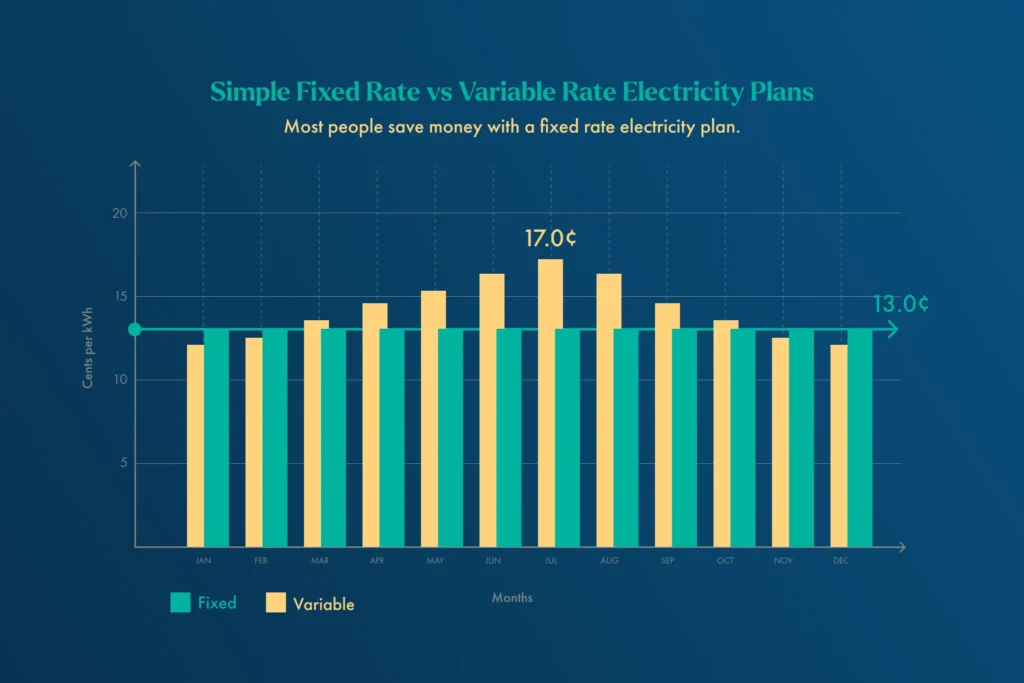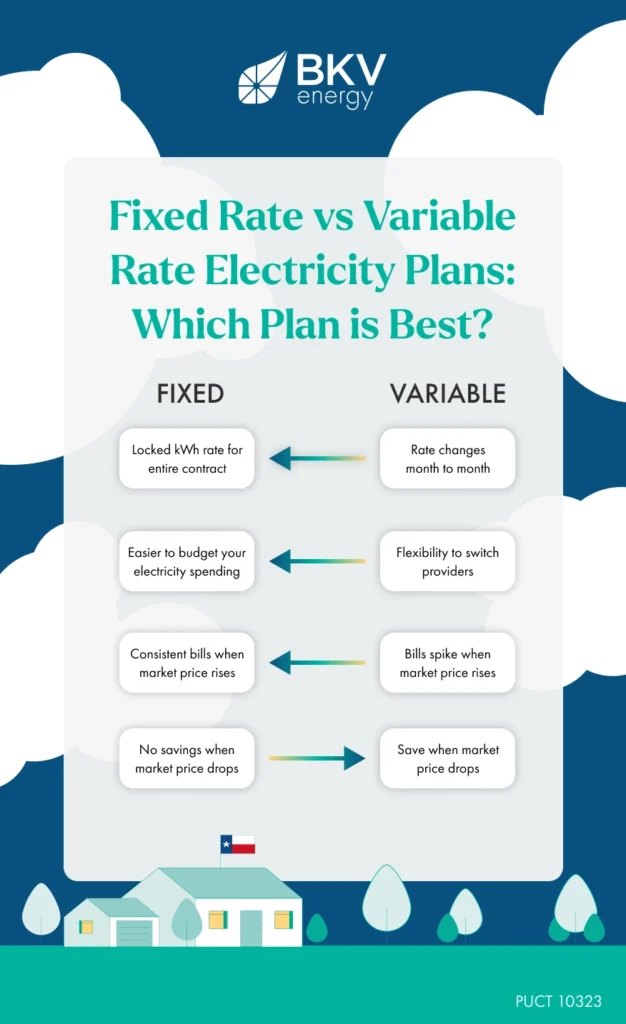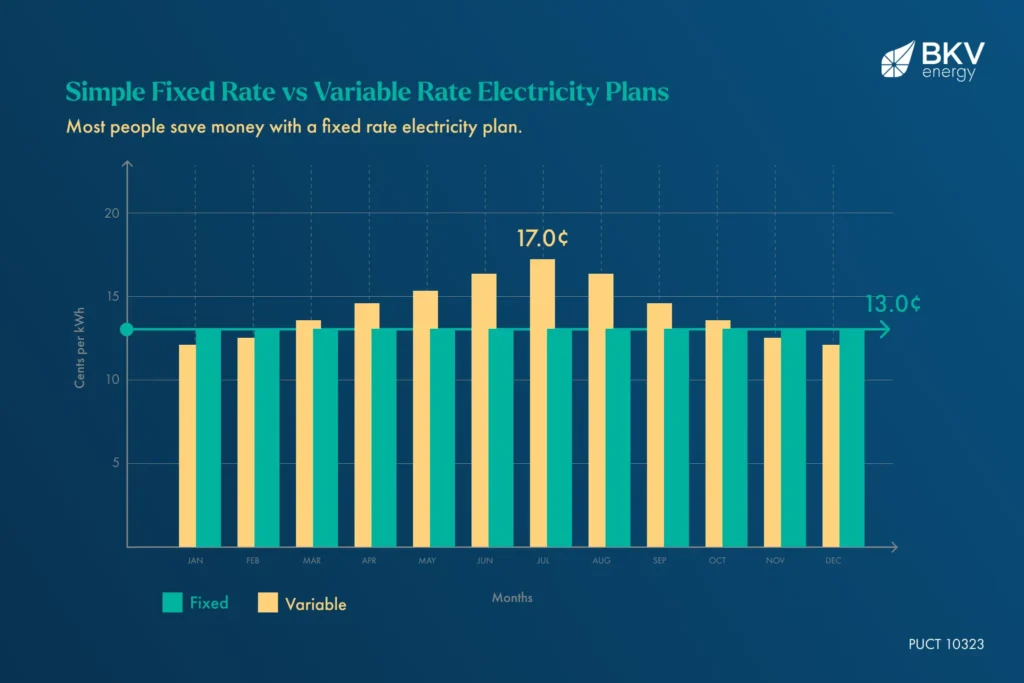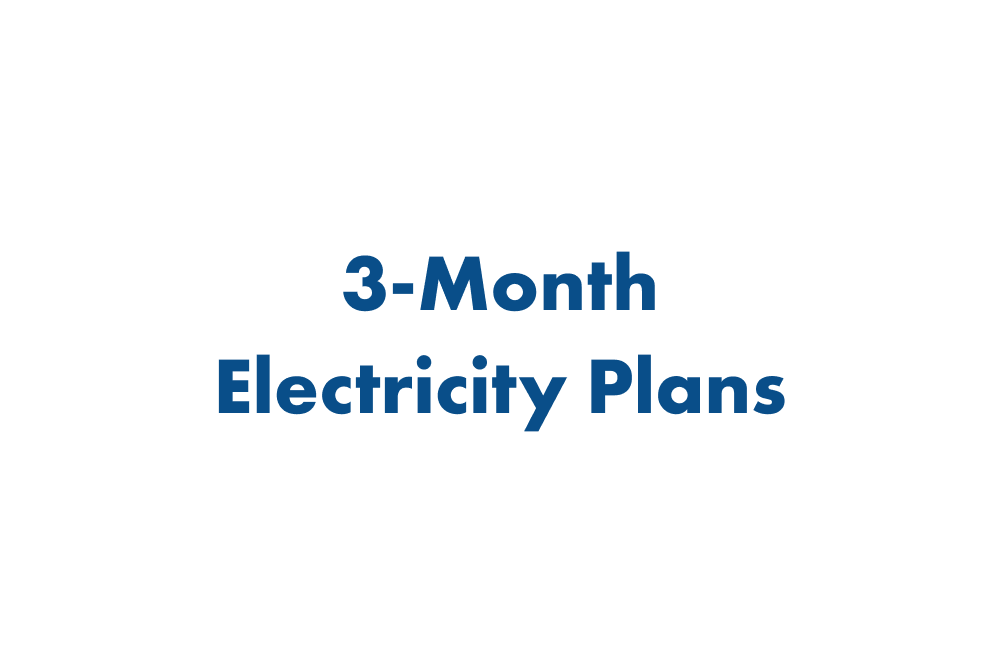When to Sign Up for 3 Month Electricity Plans
2 minute readThree-month electricity plans can be a smart choice if you time them right. In Texas, electricity prices fluctuate throughout the
Home > Learning Center > How the Energy Industry Works > Fixed vs Variable Rate Electricity Plans: Which is Best?
5 minute read • Last update February 2026

Fixed-Rate: An electricity plan with an energy charge that is locked in for the entirety of a contract. The energy charge does not change within a contract.
Variable Rate: An electricity plan with an energy charge that is subject to change each month based on changes to the wholesale electricity market.
| Fixed | Variable | |
|---|---|---|
| Energy Charge | Locked in | Changes each month |
| Predictable | Yes | No |
| Flexible | No | Yes |
| Early Termination Fees | Yes | No |
| Recommended for | Homeowners, long-term renters | Very short-term renters, landlords between renters |
Fixed-rate electricity plans are a better option for the majority of homeowners because with a fixed rate, you are locked into the same energy charge for the duration of your contract—no matter what happens to wholesale electricity prices. You are shielded from price volatility that occurs due to weather, seasonality, renewables, and other contributing factors.
There are only a few specific scenarios where a variable rate can be more affordable, such as if you are going to be living somewhere temporarily (1-2 months) and it happens to be spring or fall when the weather is milder.
By evaluating your energy usage habits, location, and market conditions, and comparing different providers and plans, you can make an informed decision and select the electricity plan that best suits your lifestyle.
Let’s dive into the pros and cons of fixed and variable-rate energy plans so you can make the best choice for your wallet, your home, and your family.

Fixed-rate electricity plans are plans with a set rate per kWh that does not change for the duration of your contract, regardless of changes to market conditions like weather and demand. With your price per kWh locked in, you have the ability to predict your electricity costs.
This allows you to budget with ease and eliminate financial surprises on your monthly bill. This is precisely what fixed-rate electricity plans offer. Fixed-rate plans are particularly beneficial for those living in extreme climates or anyone who prefers consistent budgeting.
Fixed-rate plans should not be confused with flat rate plans. Flat rate plans offer the exact same price (usually a very high base fee) each month for specific ranges of energy use. For example, if you use 0-500 kWh of energy, your bill may be $99.
If you consume 501-1000 kWh, your bill may be $159. And if you were to use 1001-2000 kWh, your bill could be $259. While flat rate plans offer even more predictability, you can often be overcharged for power.
With a flat rate plan, it’s your price per kWh that remains the same at different levels of usage, not the final bill. That being said, it’s important to note that with a fixed rate plan, your bill will change month to month based on your usage.
They are generally more predictable and manageable than those experienced with variable-rate electricity plans. In essence, fixed-rate plans provide stability and predictability in a world where energy prices can fluctuate wildly.
Fixed-rate plans offer the following benefits:
Fixed-rate energy plans are the best option for most people, but not everyone. If you prefer flexibility and the ability to switch plans when energy rates change, a fixed rate plan may not be the best option for you. Nevertheless, for those seeking stability and predictable costs, fixed-rate plans are a solid choice.
While fixed-rate plans offer stability and predictability, they also come with some drawbacks:
At BKV Energy, our early termination fee decreases the longer you are a customer – it’s only fair.
Variable rate electricity plans are plans with prices per kWh that fluctuate based on market conditions. This means you could potentially save money during periods of low demand or when market prices drop. However, the rate may also increase if market conditions drive energy prices up.
The main factors influencing variable-rate electricity plans are current electricity market conditions. This means that with a variable rate plan, you get to ride the waves of the energy market, potentially benefiting from lower prices but also facing the risk of higher costs during price spikes.
In Texas, it’s very likely that market conditions will push prices higher throughout the summer due to intense demand and high production costs across the state.

Variable rate plans offer several advantages, including:
However, it’s essential to be aware of the potential drawbacks of variable rate plans. While they offer flexibility and the chance to save money during low-demand periods, they also come with the risk of unpredictable costs and potential budgeting challenges due to market fluctuations.
The primary disadvantages of variable rate electricity plans include:
Generally, we always recommend Texans sign up for fixed-rate plans due to the stability and predictability that come with those plans. With our very long and hot summers, you are more likely to spend less on energy with a fixed rate plan.
But, ultimately, the choice between fixed and variable rate electricity plans depends on your personal preferences, risk appetite, and energy consumption habits. If you prefer flexibility and the potential for cost savings during low-demand periods, a variable rate plan may be more suitable.
Both fixed and variable rate plans have their pros and cons, and the best option for you will depend on your unique circumstances and priorities. By carefully considering your energy usage habits, location, and market conditions, you can make an informed decision and choose the electricity plan that best meets your needs.

Graham Lumley, Digital Marketing Manager at BKV Energy, leads digital and traditional marketing strategies, focusing on educating Texans about the state's deregulated energy market. With over 8 years of marketing experience, he creates content to help consumers understand and save on their energy bills, bringing a fresh and dynamic approach to the industry.

Three-month electricity plans can be a smart choice if you time them right. In Texas, electricity prices fluctuate throughout the

Figure out what electricity companies service your home
Get $50 off your electric bill!
Use code BKVEJOINUS50
Enter your zip code to shop BKV Energy's affordable, fixed-rate Texas electricity plans. Use the promo code for $50 off your electric bill.